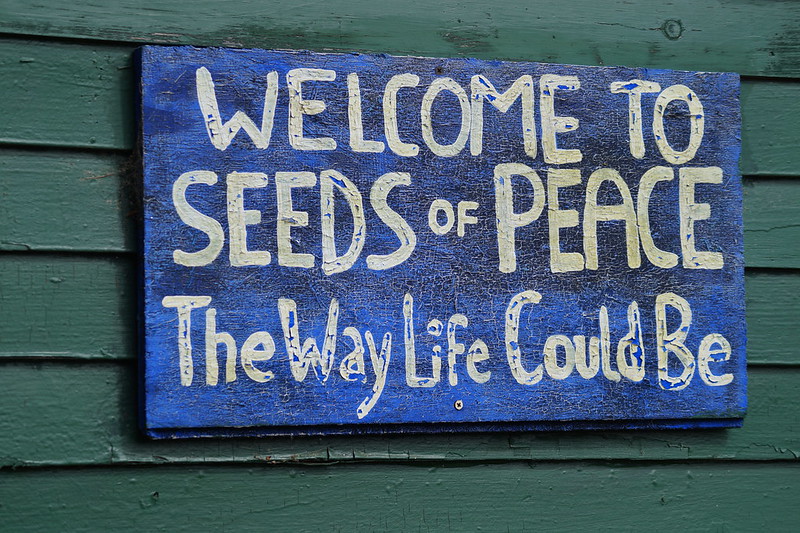Israeli, Palestinian teens work toward peace at summer camp

Seeds of Peace campers in Maine in 2017. Photo courtesy of Seeds of Peace.
(NewsNation) — Recent fighting between Israelis and Palestinians — which has led to dozens of deaths this year — serves as a reminder of the perpetual nature of the conflict. Constant imagery of war and destruction can make it impossible to imagine a peaceful coexistence.
But a summer camp hosted in Maine and run by the organization Seeds of Peace offers young people on both sides the opportunity to meet each other as equals.
Israeli citizen Jonathan Hefetz was one of those teens who attended Seeds of Peace camps in 2000 and 2002. The camp experience helped him a few years later when he turned 18, when most citizens are conscripted into the army.
Hefetz had moral qualms about serving. But refusing could mean prison. In the end, Hefetz chose to serve.
“I promised myself not to serve in Palestine and not to have any kind of contact with Palestinians to avoid moral issues that I had with the army,” he said.
At first, he served in humanitarian missions. But two weeks before he was scheduled to be discharged, he was told that he was going to be sent to an Israeli settlement in Palestinian territory.
Faced with a conundrum, he contacted a Palestinian he had befriended a few years prior at a Seeds of Peace summer camp.
“He told me, listen, I know you, I know that you’re finishing the army in two weeks,” Hefetz said. “In the name of the Palestinian people, I forgive you for that week. And the amazing thing was he actually came and visited me and brought me goods from his village.”
The other soldiers were mystified by a Palestinian befriending someone in their ranks. But the friendship helped Hefetz finish his service in the army.
The bond Hefetz was able to forge across the Israeli-Palestinian divide is one of countless connections that have been created over the years by Seeds of Peace’s summer camp program.
The organization was founded in 1993 by journalists, educators and social workers who brought together an initial group of Israeli, Palestinian, Egyptian, and American teenagers to a summer camp in Maine to break down barriers. Since then, over 4,000 youth have participated.
Teens selected to attend engage in cross-group social activities and dialogue. The Israeli Ministry of Education chooses its country’s participants, and Seeds of Peace members select Palestinians who apply to take part.
Although the Israeli-Palestinian program is the organization’s founding initiative, it also has worked with young people from 27 countries, including the United States. The goal is to cultivate leaders who will be able to lead peace-building initiatives in their communities across the world.
Much of the initial bridge-building work happens at the Maine-based summer camp Hefetz attended.

“Seeds of Peace camp looks like a traditional American summer camp. You’ve got arts and crafts, you’ve got waterfront activities, you’ve got sports throughout the day,” said Eva Armour, Seeds of Peace director of impact.
But camp participants also take part in facilitated dialogue sessions where they discuss their own life experiences and listen to others explain theirs.
“That’s where a lot of deep work happens … really discussing and understanding the conflicts that are at the root of the division between them,” Armour said.
The dialogue groups as well as pairing bunkmates from different countries were particularly useful strategies for forming these cross-group relationships, as compared to the lunch groupings, where participants ate together, according to research conducted over a seven year period.
“We speculate that not only do (cross-group) members need to be in close proximity with each other to form friendships, but it kind of needs to be like a meaningful kind of intimate proximity,” said Juliana Schroeder, the University of California, Berkley academic who conducted the research.
The young people who attend the camp are not drawn at random, meaning they are generally open-minded enough to at least attend.

Still, Schroeder noted that her surveys showed most campers didn’t arrive at the camp looking to bridge the divide.
“No one really says that they’re there to make friends with the (other group),” she said.
For Hefetz, cross-group communication is key.
“When you look at the day-to-day lives here, most of the experience Palestinians and Israelis have with one another are negative as hell,” Hefetz said. “And Seeds of Peace brings you a positive conversation where you can … deconstruct the image that the other side is trying to put on one another.”
Building bonds between youth is only the first step of Seeds of Peace’s program. The organization then encourages young people who participate — the “seeds” — to go back home and work in peace-building initiatives
In Hefetz’s case, he serves as a program director for an organization called Achvat Amim, or Solidarity of Nations, that does human rights and educational work. It’s one of dozens of projects Seeds of Peace alum are working on worldwide.
Hefetz also recently served as a Seeds of Peace camp counselor, allowing him to come full circle.










